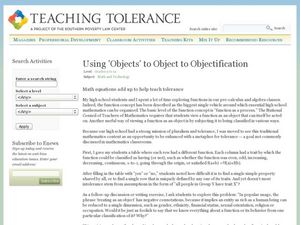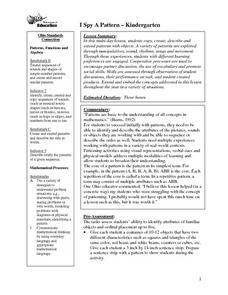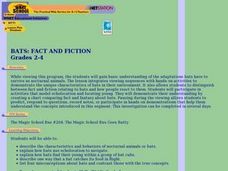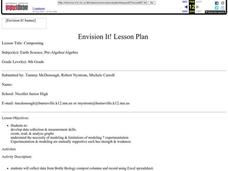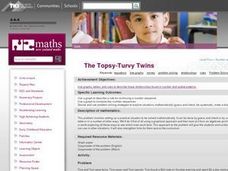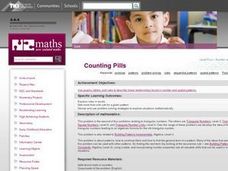Curated OER
Using Objects to Object to Objectification
Young scholars use math functions in part to complete a metaphorical lesson on tolerance. In this math and tolerance lesson, students receive rows of functions and try to find a single simple shared property without success. Young...
Curated OER
Addition Properties
Student study addition properties. In this addition properties instructional activity, students use multiple methods to solve various types of problems. Students illustrate and describe in various ways the Commutative Property of...
Curated OER
Determining Angle Measure with Parallel Lines
Students observe and solve examples of corresponding angle postulates, alternate interior angle theorems, and exterior and consecutive angles. They complete the Determining Angle Measure With Parallel Lines worksheet.
Curated OER
Sloping and Intersecting a Linear Function
Pupils examine and discuss typical linear equations, and the difference between a linear and nonlinear equation. They observe examples of linear equations and complete a worksheet.
Curated OER
I Spy a Pattern-Kindergarten
Students copy, create, describe, and extend patterns with objects. They explore a variety of patterns through the use of manipulatives, sound, rhythms, songs and movement. Cooperative processes are used to encourage partner discussion.
Curated OER
Fibonacci I
Fifth graders have the opportunity to gather information themselves on Fibonacci and on the occurrence of Fibonacci numbers in nature. They divide up into groups of 2 to 4 to research.
Curated OER
Bats: Fact and Fiction
Students describe the characteristics and behaviors of bats. After viewing a video, they explain how bats use echolocation to navigate and how they find their young within a group. They list four misconceptions about the animal and...
Curated OER
Graphing Linear Equations Using Data Tables
Pupils review the Cartesian plane and the process of plotting points. In groups, students create tables, identify the slope and y-intercept, and graph the equation. Afterward, pupils perform the same process, only, individually. As a...
Curated OER
Linear Equations Data Tables
Pupils graph linear equations on a Cartesian plane. After describing data tables and their use, students explore how the information from a table can be used to create a line graph. They discuss reasons for plotting a minimum of three...
Curated OER
Solving Motion Word Problems
In this word problems activity, students solve twenty-eight motion/rate word problems. The formula used in solving rate problems is provided at the top of the activity. Answers are provided at the bottom of the activity.
Curated OER
Composting
Eighth graders collect data from Bottle Biology compost columns and record using Excel spreadsheet.
Curated OER
Basic Math - Plan a Cruise
Young scholars measure distances and report them in fractions. They convert fractions to decimals and multiply decimals.
Curated OER
Spreadsheet Activity
Learners create a spreadsheet to match a given sample. This includes adjusting column width and row height, changing alignment, changing size and style of print, changing number format.
Curated OER
Univariate Data Analysis
Students use given data to compare baseball players. They create box and whisker plots to compare the players and determine which they feel is the best player. Students use calculators to make box and whisker plots. They write paragraphs...
Curated OER
The Topsy-Turvy Twins
Fourth graders read the problem and brainstorm for ways to solve the problem - list these on the board for the students to refer to as they solve the problem. They work in pairs and focus on the strategy selected.
Curated OER
Line Of Best Fit: Feet & Forearms
Learners actively find the line of best fit. They gather their own data and then use a calculator to find the line of best fit, as well as the equation. They see how to use the TI 81 calculator in order to find the line of best fit.
Curated OER
Can You See the Music?
Fourth graders examine the makeup of the electromagnetic spectrum and how the various forms of EMRs are similar and different from each other. They, in pairs, solve problems from worksheets imbedded in this lesson plan.
Curated OER
Counting Pills
Students are introduced to the problem. They brainstorm ideas for approaching the problem and keeping track of what has been done. Students work on the problem in pairs to discover what strategies might help to find the answer.
Curated OER
Batter Up
Students use a variety of strategies to figure out the cost of baseball tickets. They use a combination chart, notebook notation, etc. to find the cost of their family to attend a Cardinal's game in St. Louis.
Curated OER
Plan a Cruise Lesson Plan
Students measure distances and report them in fractions, convert fractions to decimals, and multiply decimals.
Curated OER
Advanced Multiplying Fractions
In this fractions instructional activity, students read an instruction sheet on the procedure for multiplying simple fractions. All steps are illustrated. There are no problems to solve.
Curated OER
All Shapes and Sizes
Sixth graders recognize international paper formats, especially the A series
Carry out practical measuring tasks on sheets of paper and Find patterns in the lengths of the sides of standard paper formats. They use patterns relating to...
Curated OER
Inequality and Simple Interest Review
Students review how to solve and graph an inequality. They also review how to find simple interest from a given problem set. The teacher performs informal assessment through observation of students.
Curated OER
Rules of Exponents
Students solve problems involving exponents. Through a teacher led discussion, students explore the rules of exponents and create cards with "x's" on them. Given a division problem, students lay out "x's" to represent the numerator and...


